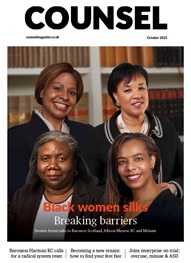*/
The criminal Very High Cost Cases (“VHCC”) Panel Scheme expired on 13 July. From 14 July 2010, litigators and advocates instructed on VHCCs with representation orders must operate under an individual case contract arrangement.
VHCC cases that are currently ongoing will continue until their conclusion, as will new cases with representation orders dated between 14 January 2008 and 13 July 2010.
VHCC cases that are currently ongoing will continue until their conclusion, as will new cases with representation orders dated between 14 January 2008 and 13 July 2010.
The criminal Very High Cost Cases (“VHCC”) Panel Scheme expired on 13 July. From 14 July 2010, litigators and advocates instructed on VHCCs with representation orders must operate under an individual case contract arrangement.


Justice system requires urgent attention and next steps on the Harman Review
Q&A with Tim Lynch of Jordan Lynch Private Finance
By Marie Law, Director of Toxicology at AlphaBiolabs
By Louise Crush of Westgate Wealth Management
Why Virtual Assistants Can Meet the Legal Profession’s Exacting Standards
Despite increased awareness, why are AI hallucinations continuing to infiltrate court cases at an alarming rate? Matthew Lee investigates
Many disabled barristers face entrenched obstacles to KC appointment – both procedural and systemic, writes Diego F Soto-Miranda
The proscribing of Palestine Action under the Terrorism Act is an assault on the English language and on civil liberties, argues Paul Harris SC, founder of the Bar Human Rights Committee
For over three decades, the Bar Mock Trial Competition has boosted the skills, knowledge and confidence of tens of thousands of state school students – as sixth-form teacher Conor Duffy and Young Citizens’ Akasa Pradhan report
Suzie Miller’s latest play puts the legal system centre stage once more. Will it galvanise change? asks Rehna Azim